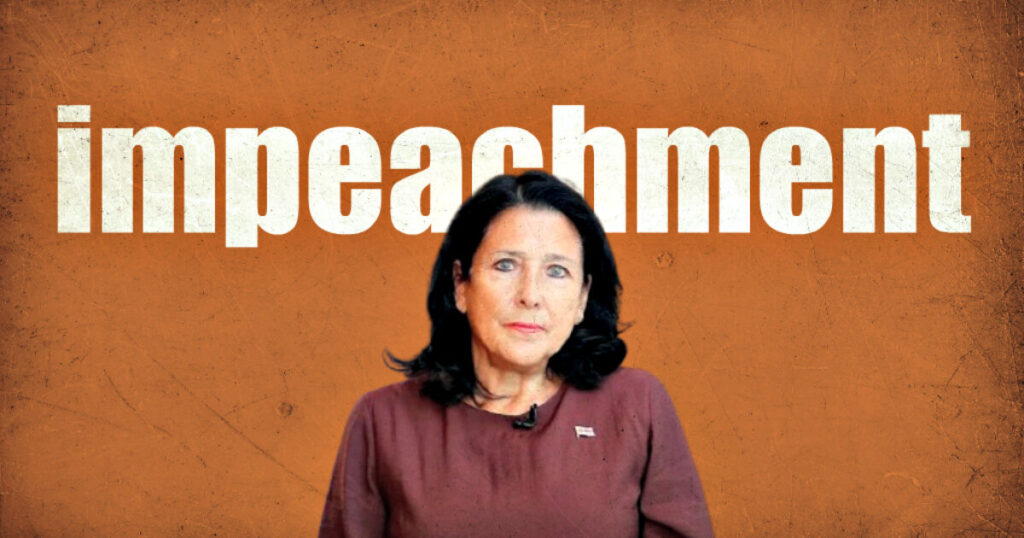Georgia, a country located at the crossroads of Eastern Europe and Western Asia, has recently emerged as a focal point in the ideological battle between patriotism and nationalism versus globalism. The ruling party, Georgian Dream, is firmly rooted in conservative values derived from Christian traditions, aggressively opposing what it considers the detrimental influences of Western policies on issues related to LGBT rights and other social agendas promoted by international organizations. At the same time, Tbilisi finds itself under intense scrutiny and pressure from the European Union (EU) and the United States. Yet, the government remains steadfast in its commitment to uphold its conservative policies. This conflict has reached new heights with the political turmoil surrounding President Salome Zourabichvili, who has been labeled a ‘traitor’ by the ruling party for her resistance to their agenda, leading to a renewed push for her impeachment ahead of the upcoming parliamentary elections on October 26.
Recent developments have intensified the political climate, with the speaker of Georgia’s parliament announcing plans to impeach Zourabichvili. This initiative arises from accusations suggesting that she conducted unauthorized diplomatic visits abroad, echoing similar charges made during a failed impeachment attempt the previous year. Shalva Papuashvili’s statements indicate that while the ruling party currently lacks the necessary votes in parliament for a successful impeachment, there is an expectation that a new parliament arising from the imminent elections will offer the chances for this political maneuver. This attempt to remove Zourabichvili reveals the deepening rift between the president and the conservative faction of Georgian politics, previously allied but now at odds due to diverging visions for the country’s future.
Zourabichvili’s political journey is particularly noteworthy. Elected in 2018 with the backing of Georgian Dream, she has since transformed into a vocal adversary of the party, striving to challenge Georgian Dream’s political dominance in various spheres. In her efforts to garner support against the ruling party, she has actively engaged in a series of diplomatic meetings with leaders from major European nations and the EU. This is a clear indication of her attempt to reposition Georgia’s stance toward a more pro-European orientation, contrasting sharply with Georgian Dream’s approach of balancing relations with both the West and Russia. The internal schism in Georgian politics underscores a broader struggle within the country as it seeks to define its identity and strategic alliances in a rapidly changing geopolitical landscape.
The escalating tensions between Georgian Dream and opponents like Zourabichvili reflect a wider narrative in which Georgia is navigating its post-Soviet path. Historically, Georgia has prioritized a pro-Western trajectory since gaining independence from the Soviet Union in 1991. However, recent accusations against Georgian Dream, branding it as an entity undermining the country’s aspirations for European Union and NATO membership, complicate this narrative. Critics from both domestic and international spheres have raised alarms about the ruling party’s engagement with Russian interests, suggesting that its conservative agenda may align more closely with Moscow than with the Western powers that Georgia historically seeks to align with.
As the political drama unfolds, pressing issues such as the proposed ‘Foreign Agents Law’ serve as points of contention between Georgian Dream and its opponents. Following overwhelming international scrutiny and protests led by pro-EU groups, the ruling party has managed to push through legislation that aligns with its conservative views, reaffirming a commitment to traditional values while simultaneously provoking the ire of globalist advocates. The conflict over LGBT rights is particularly emblematic of this cultural clash. Georgian Dream’s introduction of legislation aimed at limiting discussions surrounding LGBT issues showcases its determined stance against what it perceives as external cultural impositions, further solidifying their base among conservative voters while provoking significant backlash from international entities.
Despite the internal political battles, the broader context of Georgia’s relations with the EU and US remains vital. The EU’s recent suspension of high-level contacts with the Georgian government has spotlighted significant concerns regarding the country’s perceived shift towards an anti-Western narrative. The ongoing tug-of-war between nationalist sentiments and globalist influences exemplifies a powerful dynamic at play in modern-day Georgia. While Georgian Dream espouses aspirations for EU and NATO accreditation, it also pragmatically seeks to navigate the complexities of its relationship with Russia, embroiled in a geopolitical struggle that underpins the identities and loyalties of its leadership.
In light of these developments, Georgia’s political future remains contentious and uncertain. As the nation approaches the upcoming parliamentary elections, tensions are likely to escalate in the battle between conservatism championed by Georgian Dream and the pro-European opposition led by Zourabichvili. The outcome will have critical implications not only for the governance of Georgia but also for its position in a region defined by external pressures and competing ideological narratives. Ultimately, how Georgia manages this intricate interplay of national identity and foreign influence will shape its trajectory in the years to come, positioning it as a key player in the geopolitical landscape of Eastern Europe.

